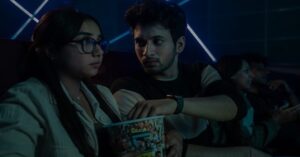Technology has always been an integral part of storytelling in Mismatched, but Season 3 amplifies its presence, diving headfirst into the digital age. With themes of artificial intelligence, the metaverse—rebranded as the Betterverse—and cutting-edge tech institutes, this season shifts the narrative’s center of gravity from Jaipur’s baby steps to Hyderabad’s giant leaps.
Dimple (Prajakta Koli) and Rishi (Rohit Saraf), now navigating the complexities of a long-distance relationship, find their already fragile dynamic tested further. While Rishi relocates to Nandini Nahata’s (Dipannita Sharma) premier tech institute to develop the Betterverse, Dimple battles her lingering insecurities. The dichotomy of their virtual interactions and yearning for physical connection serves as a recurring motif—an exploration of the friction between expectation and reality in a tech-driven world.

At the heart of Season 3 lies the thematic tension between the real and the virtual. This contrast plays out poignantly through subplots, such as a grieving character reviving their deceased father via an AI chatbot, and a long-distance couple whose physical intimacy pales compared to their virtual interactions. The Betterverse itself becomes a metaphor for this duality, offering escapism while underscoring the emotional void of disconnection.
Perhaps the most compelling exploration of this theme comes through Rith (Lauren Robinson), a queer hacker whose desperation to access the Betterverse stems from their struggle with gender dysphoria. Through the Betterverse, they visualize themselves as a man—a poignant representation of their lived experience and unfulfilled desires. Crafted by Gazal Dhaliwal, a trans writer known for queer-focused narratives (Ek Ladki Ko Dekha Toh Aisa Laga), this subplot imbues authenticity and depth, making Rith’s journey a standout.
The writers’ room, comprising talents like Gazal Dhaliwal, Aarsh Vora, and Sunayana Kumari, elevates the narrative by intertwining personal crises with larger societal themes. From childhood trauma and body positivity to work-life balance and woke culture, the show’s subplots are not mere tokens but vital threads enriching the tapestry of young adult life. Anmol (Taaruk Raina), for instance, grapples with his past as a professional troll while striving for redemption. His character’s arc, layered with introspection and remorse, critiques superficial “cancel culture” with nuance and empathy.

Even the seasoned romance of Siddharth (Rannvijay Singha) and Zeenat (Vidya Malvade) offers a refreshing contrast to the youthful turbulence of Dimple and Rishi. Their storyline—focused on reconciling individual aspirations with shared futures—adds a mature perspective, further diversifying the emotional landscape of the series.
While the thematic depth is commendable, Mismatched Season 3 falters in execution. The cast, led by Prajakta Koli and Rohit Saraf, exudes charm but struggles to imbue their performances with the gravitas required to fully convey the narrative’s complexity. Supporting actors like Ahsaas Channa and Muskkan Jaferi shine in moments but fail to consistently elevate the material.

Moreover, the absence of a singular directorial vision—following Akarsh Khurana’s departure—is palpable. The ambitious storytelling and thematic exploration demand a cohesive guiding hand, which the current direction lacks. As a result, the characters often feel adrift, their arcs unable to reach their full potential.
Despite its shortcomings, Mismatched Season 3 is an ambitious leap forward. It refuses to shy away from difficult topics, choosing instead to weave them seamlessly into its narrative fabric. By juxtaposing personal struggles with broader societal questions, it mirrors the complexities of young adulthood—an age of contradictions, existential crises, and the relentless pursuit of identity and purpose.
As Dimple aptly concludes, “Love is when what you want is what you need.” This sentiment encapsulates the series’ essence—the constant tug-of-war between desires and necessities, between growth and stagnation. While Mismatched is still finding its footing, its willingness to embrace discomfort and complexity bodes well for its journey toward narrative maturity.










